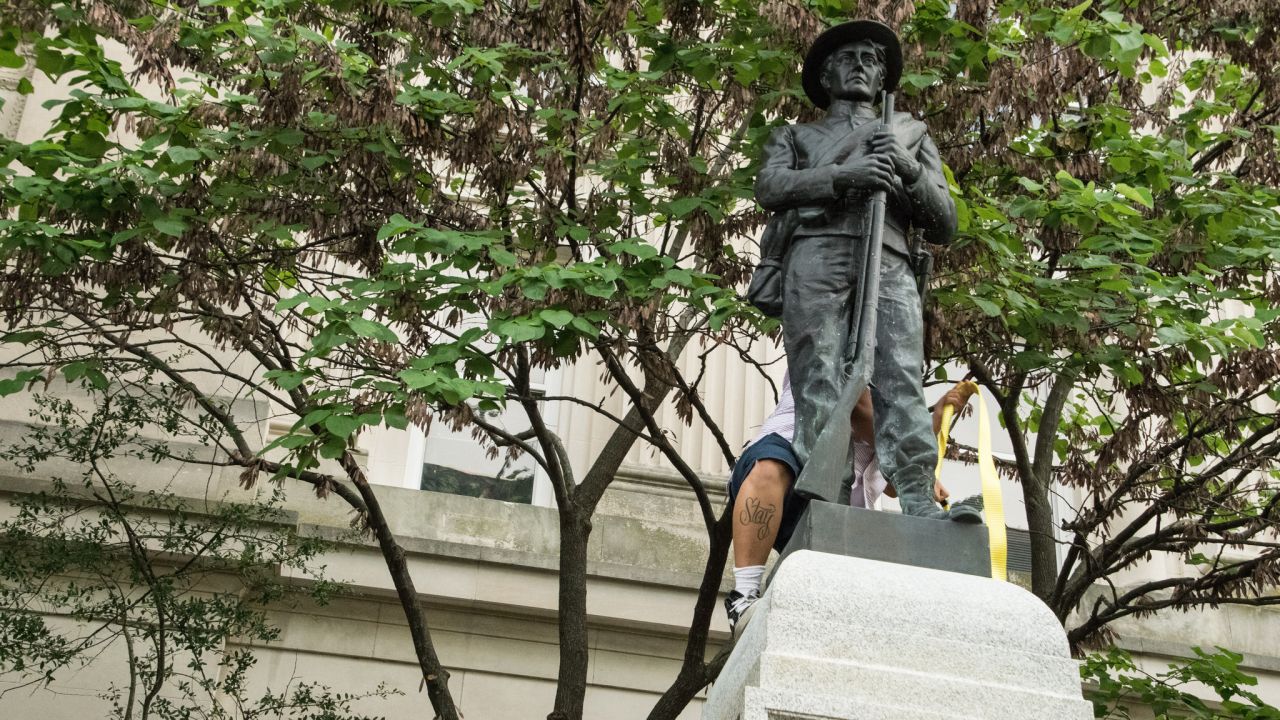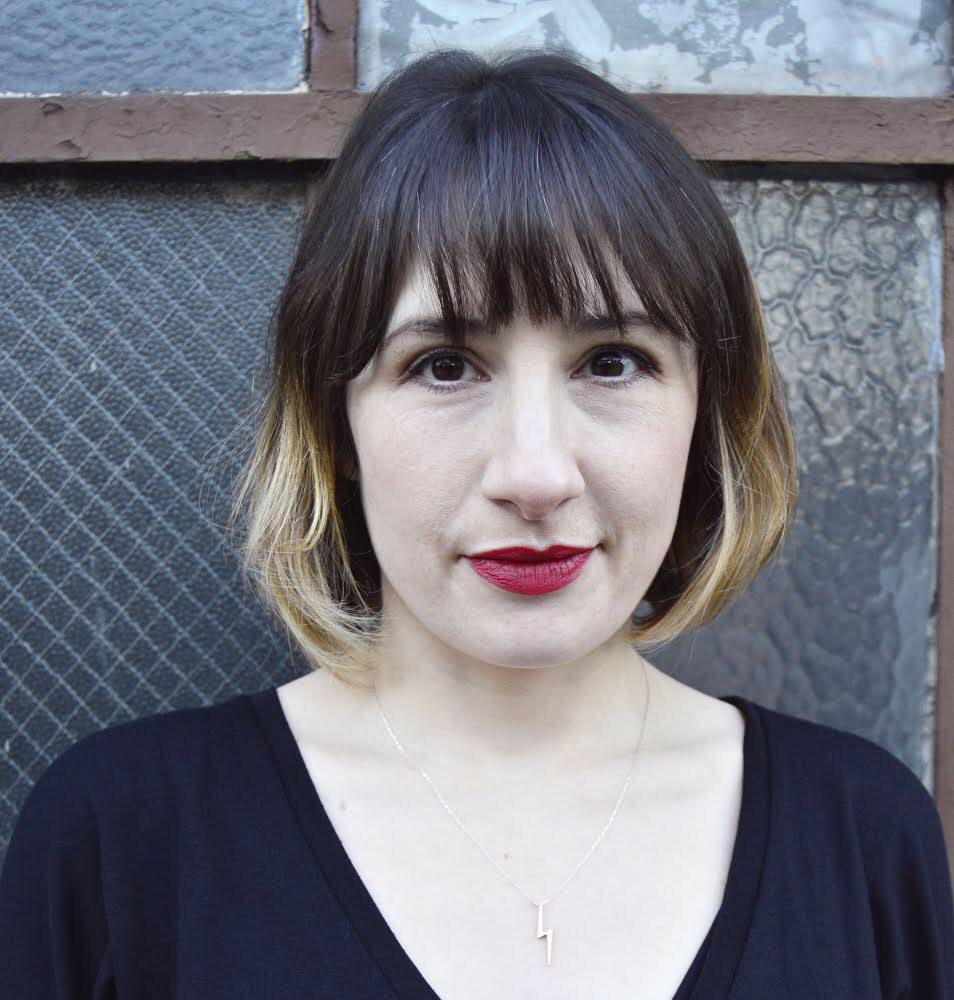
Confederate solider statue being taken down in Durham, North Carolina on, Aug. 14, 2017. (Photo by Rodney Dunning/ flickr CC 2.0)
This Q&A is part of Sarah Jaffe’s series Interviews for Resistance, in which she speaks with organizers, troublemakers and thinkers who are doing the hard work of fighting back against America’s corporate and political powers. This interview has been edited for length and clarity.
In the wake of the white supremacist attacks on Charlottesville, Virginia, this weekend, protests sprang up around the country. In North Carolina, a place laden with its own history of white supremacist violence, protesters pulled down a statue of a Confederate soldier outside of the Durham County Courthouse. Arrests and raids on activists’ homes followed.
On Thursday morning there was an attempt by hundreds to march on the jail and turn themselves in to protest the arrests and call for charges to be dropped. Angaza Laughinghouse is a longtime organizer in the area and he talks about the protests, the long fight against white supremacy in the South, and workers’ role in that struggle.
Wow! Line of residents in Durham, NC attempting to turn themselves in for 'crime' of removing Confederate Monuments
(photo Katina Parker) pic.twitter.com/DjdNS8S6rc
— Auburn (@AuburnSeminary) Aug. 17, 2017
Angaza Laughinghouse: I’m the former president of North Carolina Public Service Workers Union, and I was a founding member of Black Workers for Justice. I grew up around the main streets of Greenville, North Carolina, where the demarcation line for apartheid was between Line Street and Boundary Street. We had no public libraries in Greenville for the black community. We couldn’t cross over the line on Boundary Street to get to any of the facilities. No equal access to public facilities at all.
Sarah Jaffe: I think that is one of the things that is striking right now, is how many people forget how close this history is.
AL: Me, it is my life experience.
SJ: In North Carolina, following the events in Charlottesville this weekend, people took it upon themselves to remove the Confederate statue in Durham. Tell us a little bit about what happened and the aftermath of that.
AL: Obviously, people were angered Friday night when they saw those people marching around with those torches, those racist, white supremacist chants. We knew right then and there that that couldn’t happen without more people being engaged in this discussion. By the time Saturday rolled around, everybody was on the phone — all the activists were — emails, texts communicating that this cannot stand without us responding to the death of Heather Heyer and the people who were injured.
Later on, people were communicating about the young black man that was beaten when he went to retrieve his car. In that moment, people began talking about Sunday, that we’d have to mobilize across the state of North Carolina to tell them, to tell the world, that we weren’t going to let these fascist Nazis, white supremacists, white nationalists just murder and injure and rally their forces to push this historic white supremacist outlook.
That Sunday we began planning the activity in Durham. We began planning, also, another activity in Raleigh. In Raleigh we had a candlelight vigil in front of the Martin Luther King statue in the heart of the black community. Nine hundred people gathered to mourn the death of our comrade who was murdered and 19 injured people.
On Dec. 3 of last year the Ku Klux Klan tried to march in Raleigh to celebrate Trump. Some of them heard about the thousands of people who were gathering in Raleigh and decided to do a quick drive through through a small rural town called Roxboro, North Carolina. They actually drove down the main street for five minutes and disappeared, about 20 cars. So, we are accustomed here in North Carolina to them raising their ugly heads, ugly hate.
— Angaza Laughinghouse
SJ: After the rally in Durham and the statue being pulled down, I understand there have been arrests, that the police have been raiding people’s homes. Can you tell us a little bit about what has been happening?
AL: The day after the statue was pulled down, there was a press conference and two undercover agents approached Takiyah Thompson of North Carolina Central University, a black student and also a longtime activist. They just asked her, “Are you Takiyah Thompson?” And she said, “Yes.” There was a group of people that surrounded her as she approached the undercover car and they put her in handcuffs: “We love you and we have got your back.”
The following day they continued to round up individuals. One is a lawyer, Peter Gilbert, and one is a union organizer, Dante Strobino, and others. We are fortunate that we have a long history of working together in this community. We were able to acquire the legal services of a well-known social justice and criminal lawyer by the name of Scott Holmes. He is helping us get them out and process them as we try to pull together a team of lawyers to represent these freedom fighters that took down the statue.
SJ: The governor, who is now a Democrat, said that these statues should come down in the wake of this, right?
AL: Yes. Yesterday, Gov. Roy Cooper came out with an announcement outlining steps for the removal of all Confederate statues from state property. Under the leadership of the Republican governor, whom he defeated, Pat McCrory, they passed a law that states that they cannot move, replace [or] relocate any of these historical confederate statues from any state property.
The governor also wants to fight a bill that the Republican majority pushed successfully through the North Carolina House of Representatives that they will not hold liable anyone driving a vehicle through any these protests. The governor is urging the state Senate not to pass this bill and it appears to be losing traction.
SJ: You were telling me that you have experienced that when you are organizing, that people try to run you down with a car.
AL: One of the things that we do as a union is we oftentimes go to areas where people have to drive down a road to get into their workplace. While we are handing out the flyers, some of the anti-union people, some of the people that have old white supremacist ideas and are union haters, said: “You goddamned union communist organizer…” They try to hit you.
— Angaza Laughinghouse
It is not just a question of protests and rallies. In the “right-to-work” South, where only 1.9 percent of all workers in North Carolina were unionized in 2015, there is a lot of anti-union feeling. This white supremacist thinking is institutionalized. It is everywhere. In the history, in the workplace. It is part of the anti-union, right-to-work climate. These supremacists are now calling the county government telling them to prosecute these folks who pulled down the statue to the fullest extent of the law. It is fully institutionalized, it is systematic, this white supremacy. It is not just a few crazies as some people want to write it off.
SJ: Could you tell us a little bit more about your history in North Carolina? You have been confronting this stuff for a long time.
AL: Black people certainly have been confronting this for hundreds and hundreds of years. Whether it was lynchings or whether it was the Wilmington riots of 1898. That’s in the history books, where the white supremacists came and they burned down a black newspaper, black businesses and murdered and slaughtered black people.
As I think back to those stories my grandmother [told us] about how they robbed my great-grandfather’s store way back in the 1920s/’30s and they threw the safe on my father’s chest. My dad had a big scar on his chest. He was missing a whole pectoral muscle. There is a long history.
What brought me back was the murder of those five union organizers — the historic Greensboro Massacre of Nov. 3, 1979 — when the Klan came into a black community known as Morningside Heights and gunned down five community and union organizers who were having a rally there.
Now, there is a lawyer working down in rural areas, particularly Newton Grove, Johnson County, more what we call the Black Belt region, where the African-Americans live and the farmworkers, there again. It was very apparent the role that these white supremacists played in intimidating the workers. They would cheat them out of their wages, they would work them overtime without paying them, spray the fields with pesticides knowing the workers were still working in the fields. It shows just how this white supremacist ideology devalues black lives.
SJ: How can people support the folks that were arrested? How can people support your work in North Carolina and the organizing that is still going on in North Carolina?
AL: One of the things we are asking people to do is call the district attorney in Durham County and tell whoever answers the phone to drop the charges on the freedom fighters that took down the statue.
I think workers, too, have a unique role to play. Many of us have heard about the recent loss down in Mississippi with the United Auto Workers Union organizing of the Nissan plant down there. In light of what is happening in our workplaces, I think we have to take up this discussion of why all workers have to make every effort to defeat white supremacy, this white nationalism and neo-fascist popular movement that is developing. It keeps workers divided so we can’t unionize and win basic rights and better conditions and wages in our workplaces. It is very important to take time out to see how this impacts our workplace.
Interviews for Resistance is a project of Sarah Jaffe, with assistance from Laura Feuillebois and support from the Nation Institute. It is also available as a podcast on iTunes. Not to be reprinted without permission.




